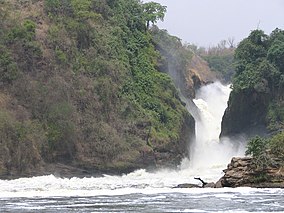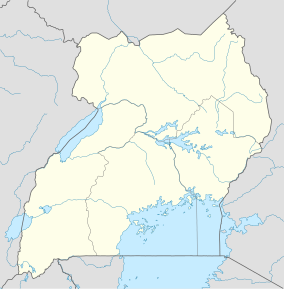Murchison Falls National Park
| Murchison Falls National Park | |
|---|---|
| Kabalega National Park | |
 | |
| Location | Uganda |
| Nearest city | Masindi |
| Coordinates | 02°11′15″N 31°46′53″E / 2.18750°N 31.78139°E |
| Area | 3,893 km2 (1,503 sq mi) |
| Established | 1952 |
| Governing body | Ugandan Wildlife Authority |
| Official name | Murchison Falls-Albert Delta Wetland System |
| Designated | 15 September 2006 |
| Reference no. | 1640[1] |
Murchison Falls National Park (MFNP) is a national park in Uganda managed by the Ugandan Wildlife Authority. Located in north-western Uganda, it spreads inland from the shores of Lake Albert, around the Victoria Nile, up to the Karuma Falls.[2]
Together with the adjacent 748 square kilometres (289 sq mi) Bugungu Wildlife Reserve and the 720 square kilometres (280 sq mi) Karuma Wildlife Reserve, the park forms the Murchison Falls Conservation Area (MFCA).[3] As of 2022, the East African Crude Oil Pipeline being built includes the construction of 10 oil well pads, a feeder pipeline, and a refinery in and around the Murchison Falls national park.[4]
Location[edit]

The park straddles the Ugandan districts of Buliisa, Nwoya, Kiryandongo, and Masindi.[2] The driving distance from Masindi, the nearest large town, to the Kibanda area of the national park is about 72 kilometres (45 mi).[5] This area is about 283 kilometres (176 mi), by road, north-west of Kampala, the capital and largest city of Uganda.[6] The coordinates of the park near the Kibanda area are 02°11'15.0"N, 31°46'53.0"E (Latitude:2.187499; Longitude:31.781400).[7]
History[edit]
The explorers John Speke and James Grant were the first Europeans to visit the present day MFCA in 1862. It was more thoroughly explored by Samuel and Florence Baker in 1863–4. Baker named the falls Murchison Falls after the geologist Roderick Murchison, then the president of the Royal Geographical Society.[8]
Between 1907 and 1912, the inhabitants of an area of about 13,000 square kilometres (5,000 sq mi) were evacuated due to sleeping sickness spread by tsetse flies. In 1910, the Bunyoro Game Reserve was created south of the River Nile. That area roughly corresponds to the part of the MFNP that is in the districts of Buliisa, Masindi, and Kiryandongo. In 1928, the boundaries were extended north of the river into the modern-day Nwoya District.[3]
In 1952, the British administration established the National Parks Act of Uganda. The area described above became Murchison Falls National Park.[3]
Overview[edit]

MFNP is Uganda's largest national park. It measures approximately 3,893 square kilometres (1,503 sq mi).[3] The park is bisected by the Victoria Nile from east to west for a distance of about 115 kilometres (71 mi).
The park is the location of the Murchison Falls, where the waters of the Nile flow through a narrow gorge only 7 metres (23 ft) wide before plunging 43 metres (141 ft).
Also in the park, adjacent to the Masindi-Gulu Highway, are the Karuma Falls, the location of the 600 megawatt Karuma Power Station, which will be Uganda's largest power station when it comes online circa 2022.[9]
As of 2022, the East African Crude Oil Pipeline being built includes the construction of 10 oil well pads, a feeder pipeline, and a refinery in and around the Murchison Falls national park.[4]
Wildlife[edit]
MFCA and the adjacent Bugondo Forest Reserve have 76 species of mammals such as Chimpanzees as well as Uganda's largest population of Nile crocodiles. There are 450 known bird species in the park, including the rare shoe-billed stork, dwarf kingfisher, Goliath heron, white-thighed hornbill and great blue turaco.[10]
Since 2005, the protected area is considered a Lion Conservation Unit.[11] In 2010, it was estimated that only 250 giraffes were in the park. A population of 37 Rothschild's giraffes was transferred from the north side of the Nile River to the south side in 2016 and 2017, when population was around 1,500.[12][13]
Tourism[edit]

Murchison Falls National Park is Uganda’s most popular national park, receiving the highest annual number of visitors of any park in the country.[14] Popular visitor activities include game drives, night drives, boat cruises to the delta and Murchison Falls waterfall, nature walks, bird watching and chimp tracking.[15] Tourists visiting Murchison Falls National Park make a 5 hours 40 minutes drive from Kampala to reach the park.[16] Tourists usually make a stop at the Rhino sanctuary en-route, to track rhinos which may increase the driving time.[17]The park is also connected by daily domestic flights from Entebbe International Airport, to Kidepo Valley National Park and Queen Elizabeth National Park, which land at Pakuba Airstrip and Bugungu Airstrip.[18] The park offers a range of tented camps and safari lodges to accommodate visitors.[19]
See also[edit]
References[edit]
- ^ "Murchison Falls-Albert Delta Wetland System". Ramsar Sites Information Service. Retrieved 25 April 2018.
- ^ a b Google (3 November 2016). "Map Showing The Location And Boundaries of Murchison Falls National Park" (Map). Google Maps. Google. Retrieved 3 November 2016.
- ^ a b c d e UWA (3 November 2016). "About Murchison Falls National Park". Kampala: Uganda Wildlife Authority (UWA). Retrieved 3 November 2016.
- ^ a b Felicity Bradstock (2022-07-26). "East African Governments Clash With Environmentalists Over New Oil Pipeline". OilPrice.com. Retrieved 2022-08-01.
- ^ Globefeed.com (3 November 2016). "Distance between Masindi Hotel, Masindi, Western Region, Uganda and Murchison Falls National Park, Kibanda, Western Region, Uganda". Globefeed.com. Retrieved 3 November 2016.
- ^ Globefeed.com (3 November 2016). "Distance between Kampala Road, Kampala, Uganda and Murchison Falls National Park, Kibanda, Western Region, Uganda". Globefeed.com. Retrieved 3 November 2016.
- ^ Google (3 November 2016). "The Geographical Coordinates of Murchison Falls National Park" (Map). Google Maps. Google. Retrieved 3 November 2016.
- ^ Thomas Paul Ofcansky (2004). Baker, Sir Samuel White (1821–1893). Oxford Dictionary of National Biography, Oxford University Press. Retrieved 3 November 2016.
- ^ Nakkazi, Esther (17 August 2009). "Karuma Heralds Ea of Abundant Power". The EastAfrican. Nairobi. Retrieved 3 November 2016.
- ^ "Murchison Falls National Park: Biodiversity". 3 November 2016. Retrieved 3 November 2016.
- ^ IUCN Cat Specialist Group (2006). Conservation Strategy for the Lion Panthera leo in Eastern and Southern Africa. Pretoria, South Africa: IUCN.
- ^ Expeditions, Simba Africa (21 December 2016). "Murchison falls Giraffe translocation | Trekking Giraffes in Uganda". www.africa-expeditions.com. Archived from the original on 22 September 2020.
- ^ "Nubian Giraffe Conservation in Uganda". Giraffe Conservation Foundation. 23 February 2016. Archived from the original on 20 September 2020.
- ^ "Visitation to National Parks". Ministry of Tourism, Wildlife & Antiquities. Retrieved 2022-06-01.
- ^ "Murchison Falls National Park – Uganda Wildlife Authority". Retrieved 2022-06-01.
- ^ "Distance between Kampala, Uganda UG and Murchison Falls, Masindi Uganda UG (Uganda)". distancecalculator.globefeed.com. Retrieved 2022-06-01.
- ^ "Murchison Falls National park - Rhino Sanctuary". AA Safaris and Tours ltd.
- ^ "Flight Schedule to Murchison Falls National Park". Savannah Wings. Retrieved 2022-06-01.
- ^ "Murchison Falls National Park – Uganda Wildlife Authority". Retrieved 2022-06-01.
External links[edit]
- BirdLife International. "Important Bird Areas factsheet: Murchison Falls National Park".
- Overview at Uganda Wildlife Authority


 French
French Deutsch
Deutsch